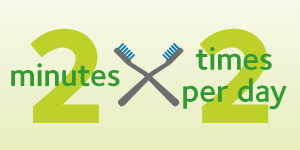What Does it Really Take to be Cavity-Free?
August 17th, 2020
Dentistry has seen a lot of change over the last 100 years.
Expecting to eventually lose several (or all!) of your teeth was once the norm. Then preventive dentistry came along and the possibility of your teeth lasting a lifetime became a reality. . . .
So what does it take for the 21st century child to stay cavity-free? Surprisingly, just a few basic steps*:
- Follow a Healthy Diet
- Establish Good Home Hygiene Habits
- Visit Your Dentist Regularly
Healthy Diet**
Diets that are high in sugar and carbohydrates create the prefect environment for cavities. Candy and sodas are obvious sources of sugar, but do you know how much sugar is lurking in your everyday foods? Processed foods that are marketed for children (ex: gummy snacks, crackers and chips, juice, breakfast cereals, granola bars, yogurts, etc.) tend to be high in sugars and carbohydrates. Bacteria in the mouth thrives on these substances, giving them plenty of cavity-making fuel.
Need help identifying unhealthy snacks in disguise? Check out this link for tips on decoding the jargon used on kid's food labels.
Whole grains, unprocessed fruits and veggies, and staying hydrated by drinking plenty of water instead of reaching for flavored drinks provides the best nutrition for your child's overall body health, including healthy teeth.

** Your pediatrician can help you plan an age-appropriate healthy diet to meet your child's developmental needs.
Home Hygiene
The dental hygienist cleans your child's teeth only twice a year - the other 363 days are up to you! Having a home routine is an important step in maintaining a clean smile. Tooth brushing should begin as soon as the first tooth erupts, - yes, even babies need their teeth brushed! - and flossing should begin as soon as teeth are touching each other.
Brush the teeth twice a day, floss once a day, and use fluoride toothpaste. Fluoride toothpaste recommendations vary by age. Please ask your dentist what's best for your child at his/her next visit.

Regular Dental Visits
Visit your dentist every 6 months for a dental cleaning and check-up.
The focus of dentistry is prevention. Your board-certified pediatric dentist is specially trained to evaluate your child's mouth, teeth, and development. When issues are caught in the early stages, treatment is less complicated and has a higher rate of success. Your dentist also provides valuable cavity-preventing services such as fluoride treatments and sealants.
Every child's needs are different. Ask your dentist about the best strategy for staying cavity-free at your next dental visit.
*PLEASE NOTE: These 3 steps should be considered as basic guidelines for healthy teeth. Visit your dentist for a thorough evaluation on your unique cavity risk and a customized oral health plan that may include more than these 3 guidelines.
Sources:















